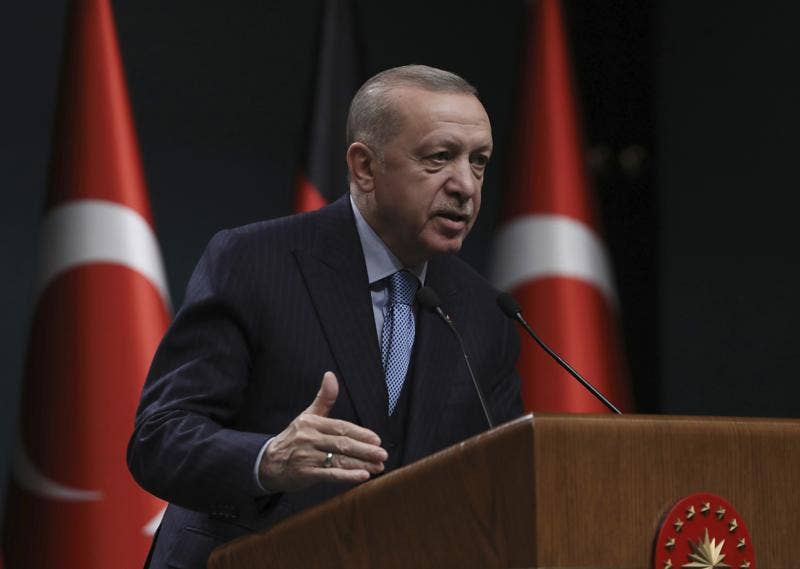Improved Syria-Turkiye ties should seek end to ‘occupation’: Assad
DUBAI: Iran has executed a British-Iranian national who once served as its deputy defense minister, its judiciary said on Saturday, defying calls from London for his release after he was handed the death sentence on charges of spying for Britain.
Britain, which had declared the case against Alireza Akbari, 61, as politically motivated and called for his release, condemned the execution.
Prime Minister Rishi Sunak called it “a callous and cowardly act carried out by a barbaric regime with no respect for the human rights of their own people.”
The Iranian judiciary’s Mizan news agency reported the execution early on Saturday, without saying when it had taken place. Late on Friday, British Foreign Secretary James Cleverly had said Iran must not follow through with the sentence — a call echoed by Washington.
French Foreign Minister Catherine Colonna summoned Iran’s charge d’affaires in Paris over the execution, the ministry said in a statement, expressing its indignation about the case.
“He was also warned that Iran’s repeated violations of international law cannot go unanswered, particularly with regard to the treatment of foreign nationals whom it arbitrarily detains,” the statement added.
The execution looks set to pile more pressure on Iran’s long strained ties with the West which have deteriorated further since talks to revive its 2015 nuclear deal hit deadlock and as Tehran unleashed a deadly crackdown on protesters last year.
In an audio recording purportedly from Akbari and broadcast by BBC Persian on Wednesday, he said he had confessed to crimes he had not committed after extensive torture.
“Alireza Akbari, who was sentenced to death on charges of corruption on earth and extensive action against the country’s internal and external security through espionage for the British government’s intelligence service … was executed,” Mizan said.
The Mizan report accused Akbari, arrested in 2019, of receiving payments of 1,805,000 euros, 265,000 pounds, and $50,000 for spying.
Sunak said on Twitter he was “appalled by the execution.” Cleverly said in a statement it would “not stand unchallenged.” “We will be summoning the Iranian Charge d’Affaires to make clear our disgust at Iran’s actions.”
British statements on the case have not addressed the Iranian charge that Akbari — who was arrested in 2019 — spied for Britain.
Meanwhile, Iranian arm of Amnesty International said on Saturday that Akbari’s execution after he was sentenced to death for spying for the UK was ‘abhorrent’.
“This morning’s execution… by Iran’s authorities again displays their abhorrent assault on the right to life. The use of the death penalty is appalling under all circumstances,” Amnesty Iran wrote on Twitter.
The group said it was “particularly horrific given the violations he revealed he was subjected to in prison, including torture & other ill-treatment” and “being forcibly administered chemical substances & being held in prolonged solitary confinement which caused him great distress”.
Amnesty called on the British government to “fully investigate Alireza Akbari’s allegations of torture and other ill-treatment, and pursue all avenues to hold the Iranian authorities to account.”
Iranian state media broadcast a video on Thursday that they said showed that Akbari played a role in the 2020 assassination of Iran’s top nuclear scientist, Mohsen Fakhrizadeh, killed in a 2020 attack outside Tehran which authorities blamed at the time on Israel.
In the video, Akbari did not confess to involvement in the assassination but said a British agent had asked for information about Fakhrizadeh.
Iran’s state media often airs purported confessions by suspects in politically charged cases.
Reuters could not establish the authenticity of the state media video and audio, or when or where they were recorded.
Akbari was a close ally of Ali Shamkhani, now the secretary of Iran’s Supreme National Security Council, who was defense minister from 1997 to 2005, when Akbari was his deputy as part of the administration of reformist President Mohammad Khatami.
’3,500 HOURS OF TORTURE’
Reflecting Iran’s worsening ties with the West, London-Tehran relations have deteriorated in recent months as efforts have stalled to revive the nuclear pact, to which Britain is a party.
Britain has also been critical of the Islamic Republic’s crackdown on anti-government protests, sparked by the death in custody of a young Iranian-Kurdish woman in September.
Iran has issued dozens of death sentences as part of the crackdown, executing at least four people.
A British foreign office minister said on Thursday that Britain was actively considering proscribing Iran’s Revolutionary Guard as a terrorist organization but has not reached a final decision.
In the audio recording broadcast by BBC Persian, Akbari said he had made false confessions as a result of torture.
“With more than 3,500 hours of torture, psychedelic drugs, and physiological and psychological pressure methods, they took away my will. They drove me to the brink of madness… and forced me to make false confessions by force of arms and death threats,” he said.
An Iranian state TV report broadcast on Saturday said the intelligence ministry had him under surveillance and arrested him in 1998. He was arrested on espionage charges again in 2008 before being freed on bail and leaving the country, it said.
Reuters could not independently verify the details.




